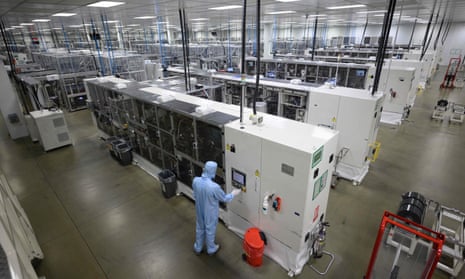The British government’s £100m-plus commitment to secure Nissan’s battery gigafactory for Sunderland has been like gadget-shopping on Amazon writ large: splurging on some new technology that has suddenly become essential – and then being immediately prompted to buy another six.
This time, though, duplicating the spending looks more sensible. More gigafactories – or plain old big battery factories – are not essential for the UK to transition to using electric vehicles (EVs). But they certainly will be if Britain hopes to keep making, selling and exporting its own cars.
While Britain is regarded as advanced in battery science and research, that is not the case in manufacturing. The only existing EV battery facility in the UK is already Nissan’s, supplying thousands of its bestselling Leafs. The £1bn investment announced last week, from the Japanese carmaker, its battery partner Envision and the taxpayer, heralds a first gigafactory, with almost five times the capacity and potentially much more.
The industry says that is welcome, but nowhere near enough. Nissan’s deal could create 6,000 new jobs, but the Society of Motor Manufacturers and Traders (SMMT) says 90,000 jobs are at risk without more gigafactories.
Driven by climate policy and Brexit, the industry is repurposing itself and jostling for position. Batteries, the fundamental component of electric cars, are mainly produced in Asia, which adds cost and subtracts value for European manufacturers.
David Bailey, professor of business economics at Birmingham Business School, says: “The industry is electrifying very quickly – we will see very rapid change over the next five to 10 years.” The cost of batteries is more than 80% lower than a decade ago, when they averaged $1,000 a kilowatt hour. “Once the cost gets down to about $100 a kWh, you’ll get parity with the cost of the internal combustion engine.”
That tipping point should be reached three to six years before the government enforces a switch away from new petrol and diesel cars in 2030, meaning electric vehicles become a cheaper – as well as greener – option for consumers, who buy some 2 million cars a year in the UK alone.

“We’re going to need a lot of batteries,” says Bailey. “They’re very heavy to move around, so transport costs are significant and car assembly is likely to gravitate to where batteries are being made.”
The other pressing factor is Brexit: the trade agreement with the EU means that by the end of 2026 the battery will have to be made in the UK or EU for an electric car produced in the UK to avoid tariffs. “Given that there is massive investment in gigafactories in the EU, the UK is lagging behind.”
By 2025, the SMMT forecasts the UK will have only a fraction of the production of other countries: 12 gigawatt hours of lithium-ion battery capacity. That compares with 91 GWh in the US, including the giant Tesla facility in Nevada, 32 GWh in France, and 164 GWh in Germany.
The business secretary, Kwasi Kwarteng, said Nissan could be the trigger for a “virtuous cycle” of new investment, although so far there are public plans, as yet unfunded, for just one other UK gigafactory – a facility for startup Britishvolt at a site in Blyth. Ford is said to be mulling options, while Jaguar Land Rover’s plans could involve a gigafactory near its West Midlands manufacturing heartland.
While the industry clamours for EU levels of funding – €3bn (£2.6bn) versus £500m pledged in the UK – some suggest policy should change. Ben Nelmes at the transport thinktank New AutoMotive argues: “A system like California’s incentivises manufacturers to sell fully zero-emission vehicles, as opposed to meeting a steadily decreasing target for grams of CO2 per kilometre. That strong policy has given rise to Tesla – it allows businesses to make those big investments in shifting their production lines over and making batteries.”
The importance of mass battery manufacturing goes beyond the car industry: it will also be crucial for the storage of green electricity, whose production fluctuates with the wind and the sun.
The desire to manufacture batteries with renewables is giving rise to innovation: the Nissan gigafactory will be accompanied by more solar and wind farms serving Sunderland, storing power in recycled car batteries for the plant’s “microgrid”, the first of its kind in the UK.
Research in Britain continues, meanwhile, into different types of battery – “solid state” cells that could be ultimately cheaper than lithium-ion. But for now, only the latter technology is sufficiently developed for car production, and the race is on. “The real danger is that unless we make batteries in the UK we will probably lose our mass car industry,” warns Bailey. “We’ve really got some catching up to do.”
